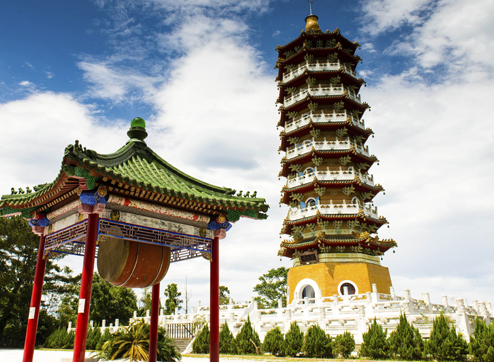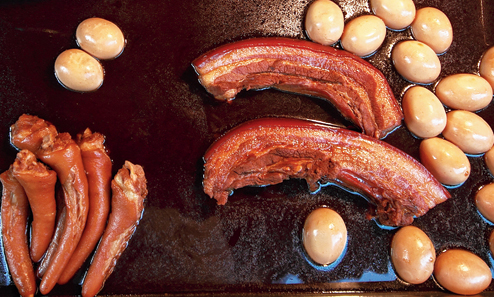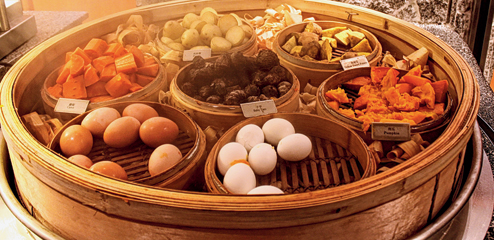An eggs-otic adventure
In Taiwan, the egg definitely came first.
By Hoihnu Hauzel

Hard-boiled eggs are comfort food for the Taiwanese. So, for many, eggs are a year-round staple. And they are no ordinary eggs that the Taiwanese knock back — rather they're sweet-scented and slow-cooked for hours with a variety of condiments to impart a particular aroma, colour and flavour. That's how particular the Taiwanese are about these humble chicken eggs.
Deep inside Taiwan, I'm intrigued by the sight of these aromatic boiled eggs. A first-timer to the island, I stand agog and watch the Taiwanese demolish eggs over breakfast, lunch and dinner. At home or in public places, they munch on hard-boiled eggs which they regularly pick up from street vendors or convenience stores. Now even 7-Eleven, a chain of departmental stores, is selling ready-to-eat eggs and trumpeting its record-breaking figures of 40 million tea eggs per year. The only conclusion can be that the locals seem to be eating eggs like never before!
Soon after checking-in at the hotel in Taipei, I made a beeline for a 7-Eleven store for my first encounter with a live station dispensing eggs. It was evening and hungry customers were queuing up for the eggs that are kept over a low fire. The egg station was steamy with vapour escaping from the pot filled with eggs.
Tea eggs are popular and come with a dark brown tone that gives the impression of them having been dipped in a dye. Usually cooked in large pots with condiments like cinnamon, star anise, fennel, soya sauce or wild mushroom and black tea bags, the trick lies in cooking them in large quantities. Once the eggs are boiled, they're cracked to let the flavour seep in. Then the flame is lowered to maintain a certain temperature.

Eggs (above and below) are cooked with all kinds of ingredients like soy sauce, tea, and even assorted condiments; (top) the Ci-En Pagoda was built by Chiang Kai-shek in memory of his mother. Pics by Hoihnu Hauzel
Since the process is tedious, people seldom cook eggs at home. Francis Hu, my guide, recalls how his parents, who fled from China, cooked eggs at home for him and his siblings when they were kids. But he and his wife prefer to buy from convenience stores.
This tradition of eggs is believed to have been popularised by immigrants from China who came along with Chiang Kai-shek, the former premier of the Republic of China, after a civil war broke out in China in 1946. Traditionally, in China, where it all began, the Chinese are known to boil their eggs with only whole spices like cloves, fennel seeds, cinnamon and peppercorns as these impart the maximum flavour and aroma.
If tea eggs are what the Chinese brought in, the Dutch and the Japanese who ruled the island at different times left behind their culinary influences too. Ready-to-eat sushi in fancy boxes and Western desserts are everywhere — from upmarket hotels to humble street shops. There's also a variety of multinational food chains brought in by modernisation, yet the youngsters still have appetite for good old tea eggs.

One evening as I browsed in the buzzing Ning Xia Night Market in Western Taipei, I saw vendors bring their cache of eggs in hot pots which they placed over stoves. The eggs were already flavoured with spices, they required no further accompaniments. I lost count of the number that I demolished.
One late afternoon at Tainan city, which is the base of Ten Drums, an art percussion group of Taiwan, I had another encounter with the delicious eggs. After sitting through an hour-long instrumental rendition by the group, we stepped outside the auditorium and saw a vendor surrounded by hungry people who had just got out from the show. Clearly, I thought, eggs are also a popular late afternoon snack.
Three hours away from Taipei, in Nantau, around the Sun Moon Lake, Taiwan's largest water body, I took a ferry from my hotel to go up a mountain. Up there, I join many others who are on their way to see the Ci-En Pagoda, a memorial built by Chiang Kai-shek in memorial of his mother.
no t
t
Not to scale; Map by Nilratan Maity
At the foot of the mountain which is accessed by stone steps, a serpentine queue marked a little shop selling tea eggs! This lone shop that sells thousands of eggs per day is owned by a lady who became rich selling eggs. Locals come here only for the eggs but with the hope of seeing the lady who is now too old to run the shop. Her children now run the show and still do brisk business.
The next morning, at the hotel breakfast buffet, I am naturally led towards the live counter of tea eggs. Just that and nothing, or may be jasmine tea to wash them down. Indeed a heart warming dish — even for tourists.
READY RECKONER
Getting there: China Airlines flies directly from New Delhi to Taipei. Others like Thai Airways, Cathay Pacific, Malaysian Airlines and Singapore Airlines fly to Taipei with stop-overs in their own city of origin
Where to stay: From basic accommodation to luxury hotels, Taiwan offers a range of options
https://www.telegraphindia.com/1140216/jsp/graphiti/17924430.jsp
The Telegraph, Sunday, February 16, 2014



